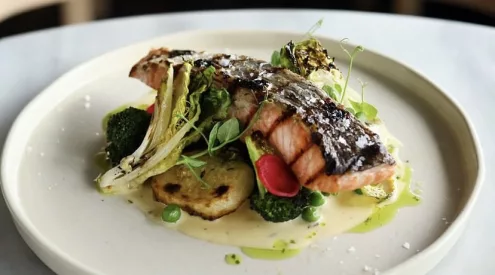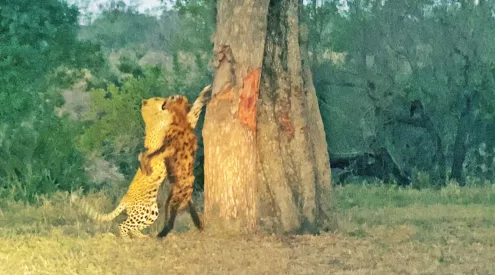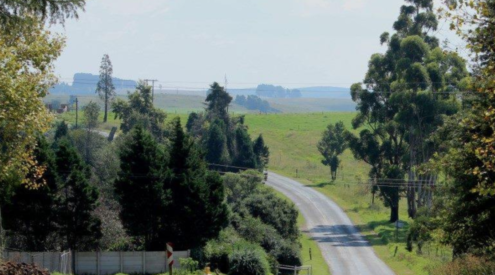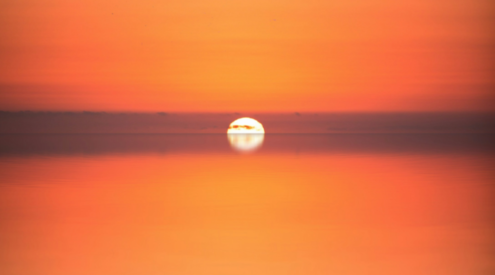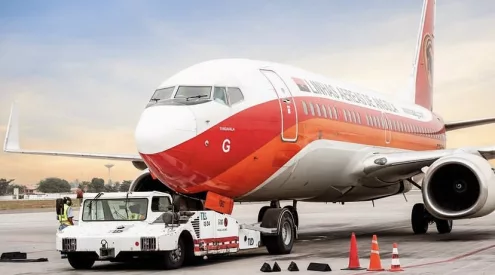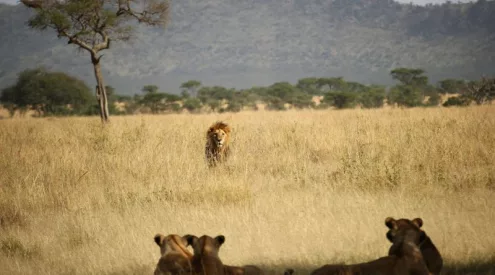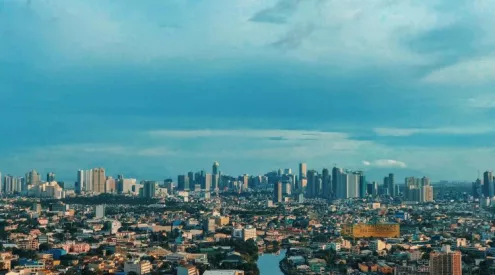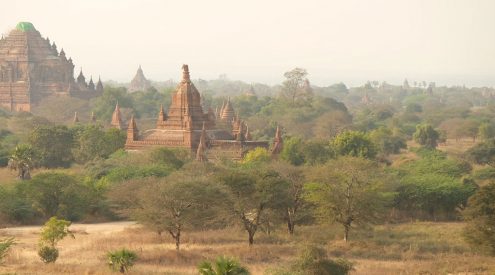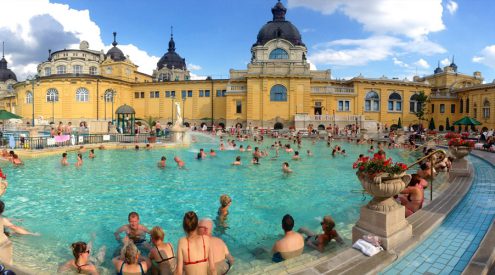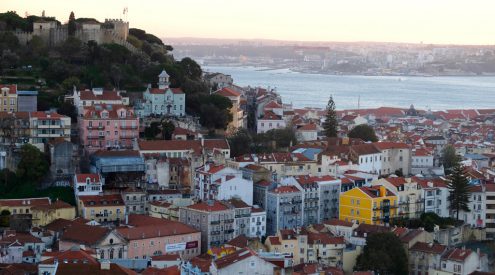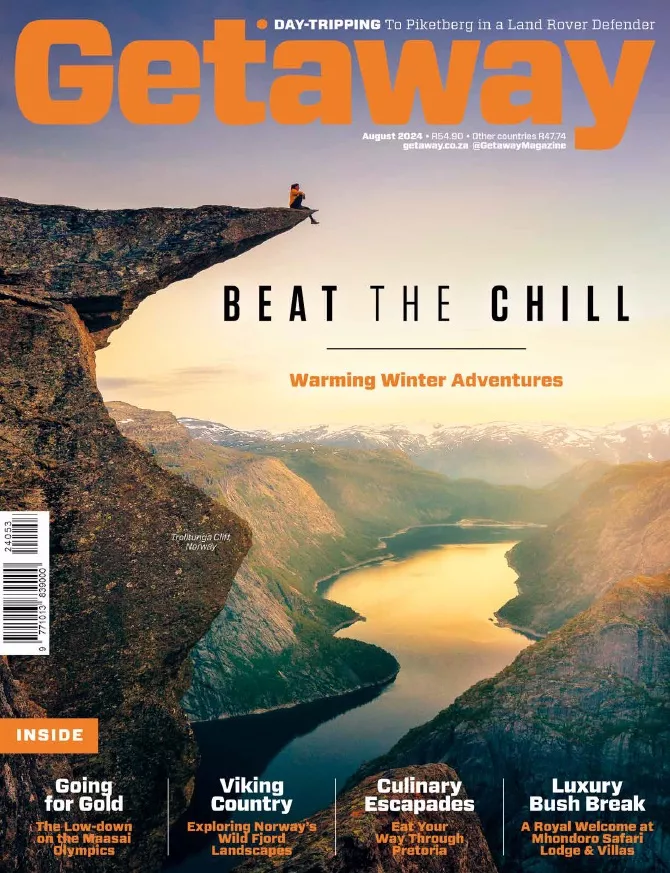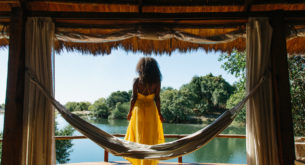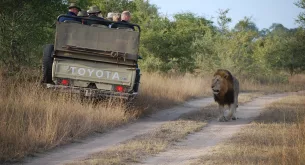A predawn haze lit the kilometre of road before us. We trudged along it, still groggy from the half hearted slumber of our bus ride from Cairo. Through a small strip “˜of no man’s land’ we entered Israel, and left Egypt behind us.
The immigration office was small, with gleaming white tiles on the floor and large cardboard posters dangling on strings from the ceiling. Grinning people were pasted onto the almost life-size cut outs – comically posing: hands on their hips – with their names below in colourful bubble letters.
We came face to face with one of the poster pinups: a large, stern-faced woman in a khaki uniform. She bore no resemblance to the cheerful photo that hung above her scowling face. “Passports,” she growled, holding her hand out impatiently. She flicked through the pages. “What you have been doing in Syria?”
“Travelling,” I answered, matter of factly.
She glared at me. “What you have been doing there? Where you have been there?” Her voice demanded an answer. It was louder now.
“Petra”¦” I began.
“Where in Syria!” she bellowed. I had slipped up: Petra was the famous archaeological site we’d visited in Jordan, not Syria. Her voice, the speed of her questions, her scowl: they were all designed to make me nervous, to make me slip up. I had nothing to hide, but felt guilty.
“Palmyra, I mean”¦” I stammered. “We visited Palmyra. And Aleppo, Damascus, Crac de Chevaliers”¦” She cut me short.
“But why you have been there?” She spat the words out; her disgust with Syria, her nation’s enemy neighbour, was clear.
“We went to Syria to travel, to visit these places”¦” I offered, wondering what it was she wanted to hear, when all I could provide was the truth. She did not respond.
“And where in Israel you want to go?”
“To Jerusalem,” I answered confidently. “Just Jerusalem. We have very little time unfortunately”¦ we fly to India on Friday.”
She cocked her head toward Iain. “Does he speak?” There was repulsion in her voice.
“I do indeed,” he answered brusquely, offended.
“Why you want to go to Jerusalem?” she continued, suspiciously.
“It is a very historical place,” I said flatly. Surely this was obvious.
“But what is there for you?” She was emotional now; she shouted the question. Beyond knowing what to say, I mumbled, shrugged, and gave up. We were admitted to the baggage scanning area.
Our backpacks passed through the x-ray machine. Three junior immigration officials – a young man and two women – began slowly unpacking them, one item at a time, scrutinizing everything that they retrieved. One of the women ran a pencil sized detector of some sort over certain items, which appeared to be randomly chosen. They worked silently, solemnly; this act of searching was important to them: we were a potential threat to their country, and they played a vital role in Israel’s national security. They could not have been older than twenty one.
One of the young women had removed our laptop from the smaller of Iain’s backpacks, and now retrieved an old, sweat stained newspaper which he had used to protect the computer. She walked over to her superior, the large woman who had interrogated us, and handed it to her. It was a copy of the Jordanian Times; on its front page was an article about an Israeli attack on Palestine.
“Why you keep this?” the woman demanded, angry.
Iain explained that it was to protect the laptop, which travelled with us everywhere. He had not kept the newspaper for any particular reason: it had been bought in Jordan, read, and then used to replace the tired paper that had protected the laptop before. But the woman’s suspicion was real now. I mentally scanned the contents of our bags. If a newspaper was dubious, what else could we be carrying that would be deemed the same? My mind jumped to one of the books that Iain was carrying: a gift from Oughzan, a friend we’d made in Istanbul. “˜Learn to Love Him’, it was called: a devotional Muslim book about Mohammed, which Iain had hesitated to leave behind, only because it had been a gift. Our bags continued to be searched. The book was not found. Silently, I thanked Oughzan’s God.
But then, the woman began grilling us with the same questions all over again. Why you go Syria? What you were doing there? Why you want to go to Jerusalem?
I was beginning to wonder what we were doing there, at the Israeli border, trying to enter a country that clearly didn’t want us. We had come from the Arab world, which had mesmerised and enchanted us, shown us hospitality we could never imagine. And now we were entering the land of their enemy; a country which doubted us because we had so much as visited its Muslim neighbour.
Finally, we were allowed to approach the counter where the dreaded visa would be issued. The presence of an Israeli entry stamp in your passport is enough to bar you from visiting several of the world’s Muslim countries. A more polite woman manned the counter, and asked us the same questions, with a little less vigour. We requested that she stamp a piece of paper, rather than our passports, as we may like to visit Pakistan.
“We don’t do that anymore,” she replied, sounding slightly unsure, perhaps expecting an argument. She took our passports away and we were asked us to sit down while someone decided whether or not to let us into the Promised Land.
*
An hour’s wait, and a four hour bus ride later, we reached Jerusalem – Jeru Salem: City of Peace – where we alighted in the basement of a shopping mall. We passed through metal detectors, queued to have my handbag searched, and entered. Inside, exclusive designer stores were lined up beside shops with familiar European brand names, fast food outlets, and escalators: the things we’d left behind in the West months before. Wealthy Jews were dripping in designer chic, strutting through the mall, parcels in hand. Teenage mall rats spent their parents’ money.
We were passed on the escalator by an adolescent girl in military uniform, balancing a very cool, very expensive looking pair of shades on her head. She wore a small backpack and juggled at least half a dozen shopping bags. One of the bags slipped, and as she bent to pick it up, so did the rifle that was casually slung over her shoulder.
Another bus dropped us off on the outskirts of Jerusalem’s ancient walls, at Damascus Gate. Beyond the gates, in the city’s Muslim quarter, we were swallowed up by a quintessential Middle Eastern souq – a labyrinthine arrangement of bustling stalls and shops organised by trade: jewellery, sticky sweets, spices, hardware, meat – which we weaved our way through with familiarity. The map to our hostel led us through the butchers’ lane with its strange damp smells, slippery with blood, until we came to a small delivery truck that blocked our narrow path. The truck’s back doors were open, and from inside, furry sheep’s heads were being tossed into a crate on the ground; the pointed jaws of skulls knocked together, bone on bone. We squeezed through the narrow gap between the truck and the wall, the sheep’s bulging eyes staring at me. A soft groan came from Iain: one of the flying furry heads had squirted blood onto his trousers. We pushed on, imitating indifference, eager to reach the shelter of that night’s home.
We checked into Citadel Hostel – a friendly Palestinian run place with a cosy sitting area where we could access free wireless internet – and waited eagerly for their geyser to heat up the water. Our overnight bus from Cairo had been preceded by an overnight train from Luxor: it had been more than two days since we’d had the privilege of a shower. Iain climbed the hostel’s four storeys to the rooftop, and quickly skipped back down, imploring me to join him. Below the hostel’s flat topped roof was a vision that, in a glimpse, epitomised the loaded complexity and enchantment of Jerusalem; the world’s most revered, most contentious city.
Flat roofed homes sprawled into the distance; tiny square windows were sprinkled onto their dusty, desert coloured walls. The sunlight greyed the green of the fir trees, and clumps of dry bush grew in pleasing patterns on the pale parched earth. A trio of golden onion-shaped domes shone up towards heaven; gleaming gold crosses clung to each dome’s elegant tip. Mosques’ towering minarets – steely blue or white – swept through the cloudless cobalt sky, speckling the cityscape, pointing their way to paradise. I sensed a buzz of energy in the city, a flurry of movement that was contained within the crenulated stone walls that framed imagined scenes below, built by S?leyman the Magnificent; the centuries old walls of ancient Jerusalem. And, dominating our view, in the centre of it all, was the Dome of the Rock: Islam’s third holiest place. The enormous nugget of a dome blazed in the sun’s rays, reflecting a gleaming gold so dazzling I wanted to avert my gaze, but could not. Intricate designs in blues and greens adorned the base of the mosque; it was absolutely beautiful.
*
The Church of the Holy Sepulchre is believed by the Catholic, Greek Orthodox, Coptic and Ethiopian churches to be the site where Jesus was crucified. We wandered through its dark interior, under grey gothic arches and over stone slabs, smoothed and cracked; aesthetic authentication that centuries of pious feet had trod their surface. Low ceilings and long narrow passages led us through the cavernous structure, until we reached a stone memorial marking the exact spot where Jesus’ crucifixion is said to have happened. The devout knelt and touched the stone, then their foreheads and chest: the shape of a crucifix; the father, the son and the holy spirit.
The church’s central area was full of bearded orthodox priests hurriedly swishing containers of incense in unfathomable ceremony. Tourists took photos. Several got in the priests’ unpredictable path while doing so, and were shoed away in shame. The church had an evocative sense of history. It conjured up memories of bible stories, which seemed less like fiction inside the ancient edifice. Snippets from “˜religious instruction’ at school came back to me; the teachers’ words once as good as the words of God Himself; but the familiar ill at ease ambience of church soon returned, and brought me back to my more complicated, sceptical present.
*
Iain and I sat in our hostel’s kitchen, eating kebabs from the souq, beside a French girl who tossed a salad, and Josh, an American, who worked his way through a dinner of sealed army rations. Avi, a young Jew who lived in Jerusalem, sat drinking the hostel’s free supply of instant coffee. He had wanted a “break”, he told us, so had come to spend a few nights in the hostel dormitory, where we would all sleep that night.
Josh was the most devout Christian I had ever met. His father was a missionary who found God after he kicked a serious cocaine problem, and now lectured at a Christian college on the non-existence of evolution. Josh was a sweet young man who was thrilled to be in Jerusalem, and equally thrilled to be joining Avi, Iain and I for a drink at a nearby pub that night: he was under 21 and couldn’t drink in the States.
As the subject of religion had already been broached, Avi saw no harm in casually asking the French girl if she believed in God. She munched at her salad, hastily jabbing her fork into fresh leaves, talking and eating simultaneously, with the finesse that only a beautiful young French woman could achieve. “No,” she said bluntly, still crunching away.
“Avi persisted: “But how can you not believe in God?” he asked.
“Religion ees stoopid,” she snapped. Her fork had been laid down; her arms waved around. “Look at what religion has caused in thees place!” The French girl’s eyes flashed with an intensity I could not identify. “My grandparents were killed!” she shouted. “Their homes in Palestine were bulldozed. My mother is French, my father is Arab: they are Christians; I am half Palestinian.” She shot Avi a look of revulsion; her big dark eyes were glossy.
*
That night, Avi took Iain, Josh and I to a very stylish Irish pub in Jerusalem’s modern, trendy district. He insisted on paying the hefty entrance fee; we consented. Josh ogled at the beer menu: an impressive four page array of international brands. Iain and I scanned it, debating our favourite brews aloud. Josh had had no idea that there were so many varieties of beer, he admitted, and looked to us for advice.
“Well,” I said, “My favourite of all these is the Leffe Blonde, which is a wheat beer. It’s very crisp, but quite strong. Eight percent, I think.”
“Okay,” said Josh, smiling. “That one sounds nice”¦ but I’ll just have a small one. It’s okay for me to drink, but I’m not allowed to get drunk,” he explained. He mentioned some of the volunteer work he’d been doing for the police force: ordering alcohol at bars and reporting the bartenders who didn’t request identification before serving him. “Man’s law is God’s law,” he said, chirpily.
The small beers turned out to be pint sized, and the large ones that Avi, Iain and I had ordered, double the size. Josh had neared the end of his glass, and now sucked on a thin cherry cigar, his face rosy. Avi leaned heavily on an elbow, his black rimmed glasses obscured his eyes. Iain and I told him and Josh about our website, and our intentions to write about our time in Jerusalem. Avi had recently had a book published, he divulged. It was a kind of philosophy – his thoughts – he said, but did not seem keen to elaborate. He looked tired, worn.
“If you want to write about Jerusalem”¦ you must understand it,” he said, sighing. “You must understand that everybody, everybody is so fucking tired of fighting. We want peace.” He exhaled a long, slow breath.
Military service is compulsory for Israelis once they finish school: three years for men, and 20 months for women. We had seen the hoards of adolescent soldiers in the Jewish quarters of the city, in poorly ironed uniforms, the girls’ hair tied into messy ponytails.
Iain asked him about the number of very large guns we had seen, casually slung over the shoulders of civilians.
“They must carry these because of the suicide bombers”¦ the terrorists,” he replied, without expression.
The only way for able-bodied youths to avoid conscription is to claim mental fragility. The potential trauma of participating in a struggle for the right of what Jews deem their Promised Land is obvious. Avi’s brother had completed his three years, we were told, after which he had taken his own life.
Avi said goodnight, and we agreed to meet the next day. When a hefty bill had arrived at the pub we were forced to borrow a bit of money, and needed to pay him back. But the next morning when we woke in our dormitory, his bed was empty. He did not return.
Continue reading No Man’s Land at OldWorldWandering.com, the story of a South African couple’s overland journey from Shanghai to Cape Town.

